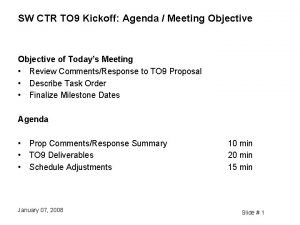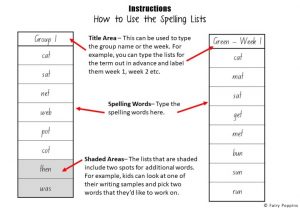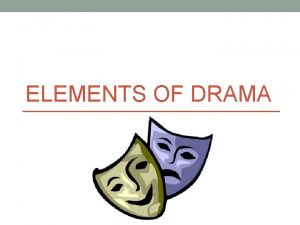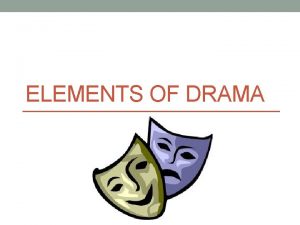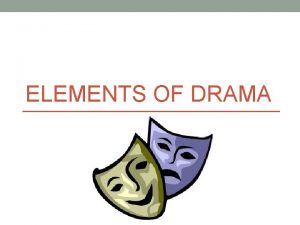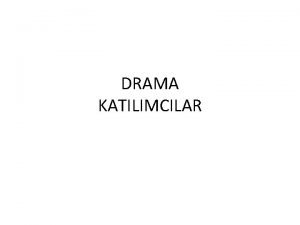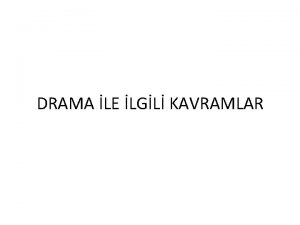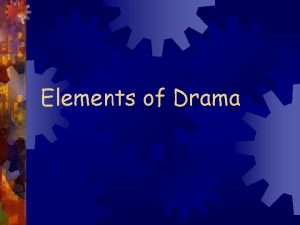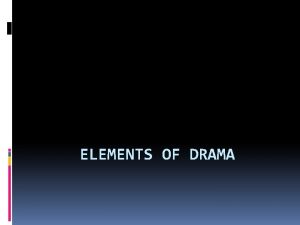Meeting 12 Elements of Drama The word drama











- Slides: 11

Meeting 12 Elements of Drama

• The word drama originates from the Greek word dran meant “deed, to do or to act”, while the world theater from the word theathron which meant “seeing place”. Thus, watching drama means you watch the deeds of men or men doing some actions on the stage. The characters are the agent of action. They do what they do because they are what they are. • When characters do something, action takes place; this action provokes other actions. Action takes place somwhere at some time; this is the setting of the play. The three essential elements of drama are character, plot, and setting.

Plot • PLOT is the structure of a play’s action. Although it encompasses what happens in a play. Plot is more than the sum of its incidents. Plot is the order of the incidents their arrangement and form. Notes: 1. Foreshadowing: gambaran awal sebelum cerita dimulai 2. Topping: Ketegangan atau konflik disepanjang cerita terus memuncak 3. Dropping: Ketegangan cerita disepanjang cerita terus menurun

• Plot is the arrangement of events or the selection and order of scenes in a play. Plot is different from the story, the story is what happens; the plot is how it happens. • A story is a full account of an event or series of events, usually in chronological order; a plot is a selection and arrangement of scenes. • Elements of Plot: • Rising Action • 1. Exposition • In which the characters and their situations are introduced.

2. Conflict The incident that occur within the play itself 3. Climax A moment of great intensity in the stories of a literary work, generally bringing events to a head and leading to the conclusion. Falling Action 1. Resolution / Denouement whatever comes after the climax, The events following the climax of a drama or novel in which such a resolution or clarification takes place or The outcome of a sequence of events; the end result.

Stages of Plot Crisis Turning point or Climax Complications Exposition Falling Action Resolution (Denoument)

The detail one o Climax o Complication o Conflict o Rising action o Iniciating moment o Exposition o Falling action o Denoument

Character & Characterization Character is its vital center. Characters bring plays to life. First and last we become absorbed in the characters: - How they look and what their appearance tells us about them; - What their say and what their manner of saying express; - What they do and how their action reveal who they are and they represent; Characterization is the creation of imaginary people who appear to be real and so believable that the reader feels she knows them. The character's name, physical appearance, actions, words, thoughts, and feelings all contribute to creating this impression. What others say how they feel about a character gives us additional insight into the character. This information is provided by the narrator of the story.

• Dialogue While dialogue is not always an element of every short story, it is prevalent enough to warrant its own section for discussion. Dialogue is conversation between characters. It is used primarily to present and develop characters. Through conversation the author can establish the situation, present actions and ideas, and express themes. • Dialogue, due to the length of a short story, needs to be succinct. It may be the controlling action in the story, but it must further the story. Also the language should be vital, rather than passive. • In a story, we are told what a character says either directly or indirectly. The direct statements of characters are indicated by the use of quotation marks. Indirect quotations report what the reader says. Indirect quotations do not use quotation marks.

Staging • Staging is a term used in theater that refers to setting up props, blocking actors, and making sure lighting is in place. These elements, and several others, need to come together to ensure a staged production comes off smoothly. Making that happen typically takes many people working together. By staging we have in mind the spectacle a play presents in performance, it’s visual detail. This includes such things as the positions of actors onstage (sometimes referred to as blocking), their nonverbal gestures and movements (also called stage business)

Theme The theme of the story conveys the author's message about people and the world in which we live. The theme is expressed through all the elements of the short story. One story may have several themes which may be expressed in different ways.

